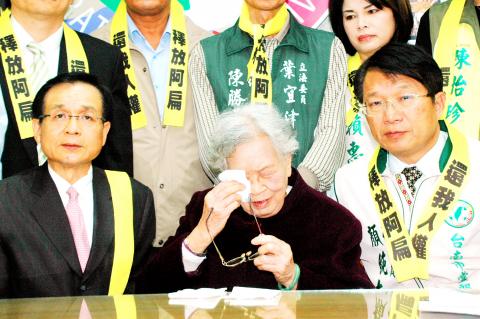Former president Chen Shui-bian (陳水扁) is to apply to the Ministry of Justice for medical parole after his latest examination showed that his deteriorating state of health meets the criteria for medical parolees, his son, Chen Chih-chung (陳致中), said yesterday, even though the ministry on Monday had denied that his condition meets the requirements for such a parole.
Chen Chih-chung said his family made the decision after the Taichung Veterans General Hospital examined his father on Nov. 4.
Minister of Justice Luo Ying-shay (羅瑩雪) on Monday said that Chen Shui-bian does not qualify for medical parole. However, she said that he had three options.

Photo: CNA
Luo said Chen could file another appeal to the Taipei District Court or lodge an objection with the Taiwan High Court against the decision by the ministry’s Agency of Corrections in October to reject his parole request.
The corrections agency on Oct. 29 rejected the request for parole, and Chen filed an appeal with the Taipei District Court. The court dismissed his appeal on Nov. 26.
Luo also said that Chen Shui-bian could apply to be diagnosed by the corrections agency, which could then consider including physicians recommended by his family on the health exam team.
Chen Chih-chung said that the motions the ministry proposed “take time and we do not have much time to spare.”
“Another point is that all these motions might in the end be referred back to the ministry due to their politically sensitive nature anyway,” he added.
Taipei Veterans General Hospital physician Kuo Cheng-deng (郭正典) — a member of the former president’s volunteer medical team — said it is “utter nonsense” for the ministry to claim that Chen Shui-bian does not need medical parole because he “keeps a normal schedule, and is eating and drinking regularly.”
“You might as well ask the Taipei Veterans General Hospital to discharge all patients other than those in its intensive care unit and emergency room,” he said.
Kuo said the ministry was “lying” when it said that Taichung Prison is “capable of handling Chen Shui-bian’s health concerns,” because the facility does not have any medical staff and even the caretakers are not properly trained in medical care.
The Nov. 4 exam found that Chen Shui-bian had shown symptoms of choking, the cause of which could be neurodegeneration, Kuo said, adding that the choking could cause sudden death by suffocation.
Chen Shui-bian’s urinary incontinence has worsened and he suffers incontinence more than 80 times a day, Kuo said, adding that his other ailments include sleep apnea, which has persisted despite surgery for it, major depression and benign prostate hyperplasia — non-cancerous enlargement of the prostate.
The Democratic Progressive Party’s branch in Greater Tainan yesterday held a press conference at which the former president’s 88-year-old mother, Chen Li Shen (陳李慎), called on the government to “let me be together with my son again.”
In tears, she said it has been heartbreaking for her to see her son emaciated and afflicted with all kinds of ailments after he was put behind bars.
“I’m afraid that I may never be with him again” if he does not get out soon, she said.

Conflict with Taiwan could leave China with “massive economic disruption, catastrophic military losses, significant social unrest, and devastating sanctions,” a US think tank said in a report released on Monday. The German Marshall Fund released a report titled If China Attacks Taiwan: The Consequences for China of “Minor Conflict” and “Major War” Scenarios. The report details the “massive” economic, military, social and international costs to China in the event of a minor conflict or major war with Taiwan, estimating that the Chinese People’s Liberation Army (PLA) could sustain losses of more than half of its active-duty ground forces, including 100,000 troops. Understanding Chinese

The Ministry of Foreign Affairs (MOFA) yesterday said it is closely monitoring developments in Venezuela, and would continue to cooperate with democratic allies and work together for regional and global security, stability, and prosperity. The remarks came after the US on Saturday launched a series of airstrikes in Venezuela and kidnapped Venezuelan President Nicolas Maduro, who was later flown to New York along with his wife. The pair face US charges related to drug trafficking and alleged cooperation with gangs designated as terrorist organizations. Maduro has denied the allegations. The ministry said that it is closely monitoring the political and economic situation

UNRELENTING: China attempted cyberattacks on Taiwan’s critical infrastructure 2.63 million times per day last year, up from 1.23 million in 2023, the NSB said China’s cyberarmy has long engaged in cyberattacks against Taiwan’s critical infrastructure, employing diverse and evolving tactics, the National Security Bureau (NSB) said yesterday, adding that cyberattacks on critical energy infrastructure last year increased 10-fold compared with the previous year. The NSB yesterday released a report titled Analysis on China’s Cyber Threats to Taiwan’s Critical Infrastructure in 2025, outlining the number of cyberattacks, major tactics and hacker groups. Taiwan’s national intelligence community identified a large number of cybersecurity incidents last year, the bureau said in a statement. China’s cyberarmy last year launched an average of 2.63 million intrusion attempts per day targeting Taiwan’s critical

AGING: As of last month, people aged 65 or older accounted for 20.06 percent of the total population and the number of couples who got married fell by 18,685 from 2024 Taiwan has surpassed South Korea as the country least willing to have children, with an annual crude birthrate of 4.62 per 1,000 people, Ministry of the Interior data showed yesterday. The nation was previously ranked the second-lowest country in terms of total fertility rate, or the average number of children a woman has in her lifetime. However, South Korea’s fertility rate began to recover from 2023, with total fertility rate rising from 0.72 and estimated to reach 0.82 to 0.85 by last year, and the crude birthrate projected at 6.7 per 1,000 people. Japan’s crude birthrate was projected to fall below six,